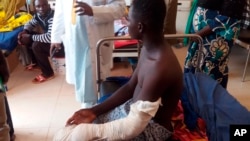Mali's army and jihadist groups have carried out massacres and hundreds of human rights violations, the U.N. said in a report that details previously undocumented abuses against civilians.
The U.N. Mission in Mali (MINUSMA) report, seen by AFP on Thursday, catalogues 375 rights violations in the country between July and September, attributing 163 to jihadist groups and 162 to the Malian army.
It added 33 were carried out by militias, and 17 by armed groups that signed a 2015 peace agreement in northern Mali.
The report details for the first time several abuses that had been impossible to report on previously because of challenges on the ground.
It said 14 dead bodies were found in Gassel village in the Douentza region on September 12 "with their hands tied behind their backs," a few hours after the army and "foreign military personnel" had arrested them.
Bamako denies a military operation in Gassel, the U.N. said.
Five days later, in the central Malian town of Gouni, "foreign military personnel accompanied by traditional hunters" killed "around fifty people, of whom 43 were formally identified," the report said.
It added that Bamako had launched an investigation. Mali's junta, which seized power in 2020, often claims it carries out probes, but the results are very rarely made public.
At the start of September, the report says, 12 women were raped in Tandiama and Nia Ouro in the Mopti region of central Mali as part of a joint operation between the Malian army, foreign military personnel and traditional hunters.
Five people from Nia Ouro, including the village chief and imam, have also been missing since the operation after being taken to a nearby military camp, the U.N. said.
Bamako said it was "not aware of the facts reported," adding that an investigation was under way.
The report follows others published by the U.N. and independent experts it has commissioned to document abuses by the Malian army with foreign support.
The alleged presence of mercenaries from the Kremlin-linked Wagner group, which has not been officially acknowledged by Bamako, is widely criticized by human rights groups and Mali's partners.
The violations the U.N. attributes to the army took place in central Mali, where the military has been conducting a large-scale operation since the start of the year.
The army has previously been accused of massacring civilians, including in Moura and Hombori.
The abuses attributed to jihadist groups — some affiliated with al-Qaida and others with the Islamic State group — have almost all taken place in Mali's northeast where there has been frequent fighting since March.




